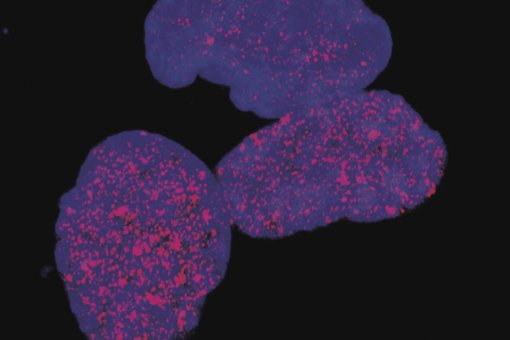Images
Contact

Researchers at IRB Barcelona participate in Harvard University study, published in Nature Immunology
A study, led by researchers at Harvard University, and in which researchers from the Institute for Research in Biomedicine have collaborated, has raised questions about the possible therapeutic effects of inhibitors of protein kinase p38alpha during inflammation. The study, which modelled inflammation in skin cells, showed that p38alpha exerts different inflammatory effects depending on the cell type in which it is expressed and the stimulus eliciting its activation. The research appears this week as an advance online publication in Nature Immunology.
Antonio Celada: "Protein kinase p38alpha plays a role in both the pro-inflammatory and anti-inflammatory phases, indicating that new targets may need to be sought in order to treat inflammation."
Co-author of the study, Antonio Celada, head of the Macrophage Biology group at IRB Barcelona and professor at the University of Barcelona, explains that “protein kinase p38alpha plays a role in both the pro-inflammatory and anti-inflammatory phases, indicating that new targets may need to be sought in order to treat inflammation.”
Inflammation is a response of the immune system to any external agent, such as infectious molecules, traumas, injury cased by ultraviolet rays, chemicals, etc. Inflammation has a pro-inflammatory – or destructive – phase where germs are eliminated, and an anti-inflammatory – or constructive – phase, where healing takes places. When uncontrolled, inflammation can be chronic and lead to serious conditions, such as rheumatoid arthritis, psoriasis, multiple sclerosis, cardiovascular disease, and even cancer or diabetes.
Inflammation involves different types of cells, which must be activated in order to carry out their functions. These cells are activated by molecules which bind to receptors on the cell surface, switching on or off the genes that tell each cell what to do. Protein kinase p38alpha is one of the molecules involved in these signalling events, and is responsible for activating an important regulatory mechanism, called phosphorylation.
The collaboration between the groups of Antonio Celada at IRB Barcelona and Jin Mo Park at Harvard has led to the publication of other articles on inflammation. A previous study, Selective roles of MAPKs during the macrophage response to IFN-gamma by Valledor, Sanchez-Tillo, Arpa, Park, Caelles, LLoberas & Celada, was published earlier this year in the Journal of Immunology of the American Association of Immunology.
Reference:
The kinase p38a serves cell type–specific inflammatory functions in skin injury and coordinates pro- and anti-inflammatory gene expression”
Chun Kim, Yasuyo Sano, Kristina Todorova, Bradley A Carlson, Luis Arpa, Antonio Celada, Toby Lawrence, Kinya Otsu, Janice L Brissette, J Simon C Arthur & Jin Mo Park
Nature Immunology 2008 (doi: 10.1038/ni.1640)
About IRB Barcelona
The Institute for Research in Biomedicine (IRB Barcelona) pursues a society free of disease. To this end, it conducts multidisciplinary research of excellence to cure cancer and other diseases linked to ageing. It establishes technology transfer agreements with the pharmaceutical industry and major hospitals to bring research results closer to society, and organises a range of science outreach activities to engage the public in an open dialogue. IRB Barcelona is an international centre that hosts 400 researchers and more than 30 nationalities. Recognised as a Severo Ochoa Centre of Excellence since 2011, IRB Barcelona is a CERCA centre and member of the Barcelona Institute of Science and Technology (BIST).




